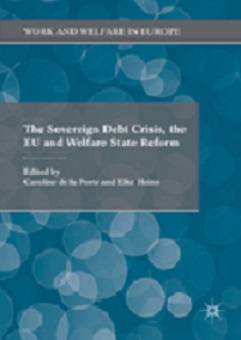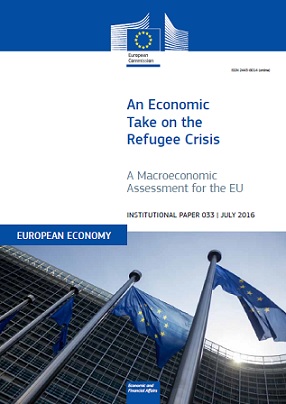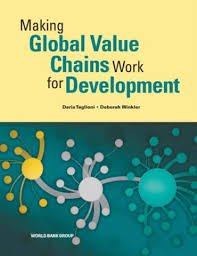De La Porte, Caroline, Heins, Elke, (2016), “The Sovereign Debt Crisis, the EU and Welfare State Reform”, Palgrave Macmillan UK This book offers a much-needed analysis of how the European Union (EU) has affected welfare state reforms in the Member States most severely hit by the 2008 economic crisis. Bringing together leading European social policy researchers, it shows that the EU’s responses to the sovereign debt crisis have changed the nature of EU …Read More
Understanding the Sources of Macroeconomic Uncertainty
Rossi, Barbara, Sekhposyan, Tatevik, Soupre, Mattheiu, (2016), “Understanding the Sources of Macroeconomic Uncertainty”, Center for Economic Policy Research, July We propose a decomposition to distinguish between Knightian uncertainty (ambiguity) and risk, where the first measures the uncertainty about the probability distribution generating the data, while the second measures uncertainty about the odds of the outcomes when the probability distribution is known. We use the Survey of Professional Forecasters (SPF) density forecasts …Read More
Growth in a Time of Disruption
Spence, Michael, (2016), “Growth in a Time of Disruption”, Project Syndicate, 27 July Developing countries are facing major obstacles – many of which they have little to no control over – to achieving sustained high growth. Beyond the headwinds generated by slow advanced-economy growth and abnormal post-crisis monetary and financial conditions, there are the disruptive impacts of digital technology, which are set to erode developing economies’ comparative advantage in labor-intensive manufacturing …Read More
Europe and the people: Examining the EU’s democratic legitimacy
Hug, Adam, (2016), “Europe and the people: Examining the EU’s democratic legitimacy”, The Foreign Policy Centre, June The European Union finds itself at a critical juncture. The long-term political impacts of the 2008 economic crisis and the rising pressures of globalisation have helped to drive public distrust in traditional sources of influence and authority. As a supranational institution trying to bring together the disparate wills of 28 member state publics …Read More
An Economic Take on the Refugee Crisis
European Commission, (2016), “An Economic Take on the Refugee Crisis”, European Commission, Institutional Paper 033, July Europe is facing an unprecedented surge in the number of asylum seekers and refugees. These flows have put considerable strain on public authorities in several Member States. From a purely macroeconomic point of view, the impact appears moderate, stemming in the short term from increased public spending and, over time, a slight rise in labour …Read More
How income inequality affects euro area current account imbalances
Marzinotto, Benedicta, (2016), “How income inequality affects euro area current account imbalances”, LSE Europpblog, 27 July Since the late 2000s financial crisis, a great deal of attention has been focused on the issue of how inequality affects the lives of citizens. But can inequality also explain some of the macroeconomic trends present in European countries? Benedicta Marzinotto writes on the link between inequality and current account imbalances in the Eurozone. Using …Read More
External and Public Debt Crises
Arellano, Cristina, Atkeson, Andrew, Wright, Mark, (2016), “External and Public Debt Crises”, NBER Macroeconomics Annual, Volume 30 Number 1 At the end of the first decade of the twenty-first century, the members of two advanced monetary and economic unions, the nations of the euro zone and the US States, experienced debt crises with spreads on government borrowing rising dramatically: in a short period of time, Californian spreads rose sixfold, Italian rose tenfold, Illinois fifteenfold and …Read More
The insurance sector and systemic risk
Gelos, Gaston, Valckx, Nico, (2016), “The insurance sector and systemic risk”, Voxeu, 27 July In recent years, the life insurance sector has become more systemically important across advanced economies. This increase is largely due to growing common exposures and to insurers’ rising interest rate sensitivity. This column analyses the evolution of the insurance sector’s contribution to systemic risk. Overall, life insurers do not seem to have markedly changed their asset portfolios …Read More
Making Global Value Chains Work for Development
Taglioni, Daria, Winkler, Deborah, (2016) “Making Global Value Chains Work for Development”, World Bank, June Economic, technological, and political shifts as well as changing business strategies have driven firms to unbundle production processes and disperse them across countries. Thanks to these changes, developing countries can now increase their participation in global value chains (GVCs) and thus become more competitive in agriculture, manufacturing and services. This is a paradigm shift from the …Read More
Credit booms and macrofinancial stability
Dell’Ariccia, Giovanni, Igan, Deniz, Laeven, Luc, Tong, Hui, (2016), “Credit booms and macrofinancial stability”, Economic Policy, Volume 31, Issue 86, 31 Μarch This paper explores several questions about credit booms and busts: When do credit booms occur? When do they end up in busts, and when do they not? What are the implications for different policies if curbing credit growth and/or mitigating the associated risks is an objective? We find that credit booms are often associated …Read More







